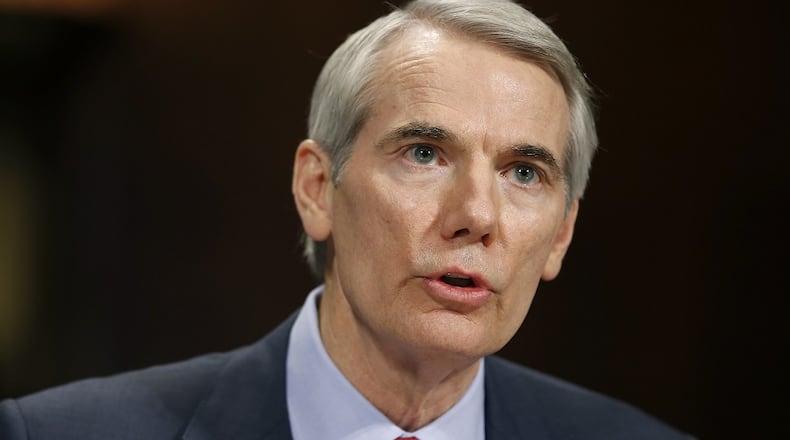In a tweet, the president said, “With just a few changes, some mathematical, the middle class and job producers can get even more in actual dollars and savings.”
Trump and Senate leaders are trying to balance competing demands, as some senators fear the package would add to the nation’s mounting debt, while others want more generous tax breaks for businesses. In a boost for the legislation, Republican Sen. Rand Paul of Kentucky said he would back the measure.
Trump hosted Republican members of the Senate Finance Committee, including Ohio Sen. Rob Portman, at the White House Monday.
Portman ‘confident’
Portman said he was “confident” the Senate would approve the overhaul of the federal income tax code, a measure which includes a major tax reduction for corporations, small companies and many individuals.
Following the meeting with President Trump, Portman said “we had a good meeting today and I want to thank the president for supporting our effort to deliver on the promise to cut taxes for middle-class families and reform a broken tax code.”
“I am confident that the Senate will pass this bill and we will have a good bill on the president’s desk before Christmas,” Portman said.
The U.S. House earlier approved its own version of the tax bill. Congressional Republicans are relying solely on their own majorities in the House and Senate to pass the bill because Democrats have argued it favors the wealthy and would dramatically increase the federal deficit.
Vote to come this week
Sen. John Cornyn of Texas, the No. 2 Republican in the Senate, said the plan is to vote on the current tax bill this week, then work out the differences between the Senate bill and one passed by the House earlier this month.
RELATED: How would the plan impact you? Use our calculator
“We think the Senate bill made some substantial improvements over the House bill but we’ll work through those when we get to a conference committee with the House,” Cornyn told reporters.
But as of Monday, GOP leaders were still trying to round up the votes in the Senate to pass the bill.
“We always have to deal with everybody. It’s not any one particular person,” said Sen. Orrin Hatch, R-Utah, chairman of the Finance Committee. “These are tough times, these are tough issues, they’re hard to deal with and we’ve had to deal with them.”
Trump suggested he is open to making unspecified changes to the way millions of “pass-through” businesses are taxed, a sticking point for some lawmakers. These are businesses in which profits are passed onto the owners, who report the income on their individual tax returns. The vast majority of U.S. businesses, big and small, are taxed this way.
Sen. Ron Johnson, R-Wis., has already declared his opposition to the current bill, saying it doesn’t cut business taxes enough for these types of partnerships and corporations. Johnson gets substantial income from such companies, including a manufacturer he helped found in Wisconsin and a commercial real estate company, according to his financial disclosure statements.
Trump and Republicans have set as a vital political goal the passage of tax overhaul legislation by the end of the year. The House recently passed a $1.5 trillion bill. Senate GOP leaders hope to muscle their bill through this week.
Trump was meeting Monday with five members of the Senate Finance Committee who are on board with the GOP plan. He will travel to Capitol Hill Tuesday to lobby Republican senators personally.
Republicans have only two votes to spare in the Senate, where they hold a 52-48 edge.
Their package blends a reduction in top corporate and business tax rates with more modest relief for individuals.
Democrats say the package would mainly help corporations and the rich. Their argument was bolstered by a new congressional analysis that says the Senate bill would leave many low- and middle-income families worse off, while the wealthy would get big benefits. The analysis was done by the nonpartisan Congressional Budget Office.
Holdouts include Republican Sen. Susan Collins of Maine, who has objected to a provision in the Senate bill repealing the requirement under the “Obamacare” program that everyone have health insurance. Collins has said that issue should be dealt with separately from the effort to overhaul the tax code.
Republican Sens. Bob Corker of Tennessee and John McCain and Jeff Flake of Arizona worry that the package will add to the nation’s mounting debt.
___
Associated Press writers Stephen Ohlemacher, Marcy Gordon, Andrew Taylor, Ken Thomas and Zeke Miller contributed to this report.
